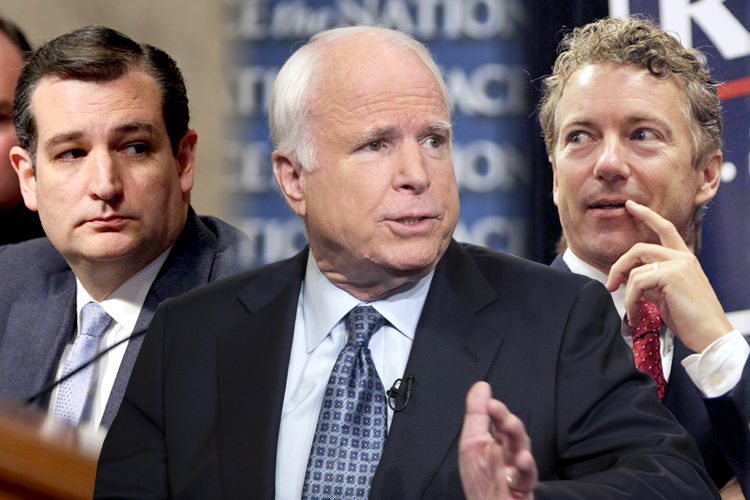Many have noted, including Salon’s Alex Pareene, that John McCain is “the senator everyone in the press listens to.” While this is certainly true, a key question remains: Why? Why is John McCain, years after his solidly defeated presidential run, a man who isn’t even the top Republican on a key committee — a man who, truth be told, most Republicans don’t particularly like and never trusted — the leader of the opposition on foreign affairs and national security?
Actually, it’s not just because a lot of elite reporters appear to worship the guy. Politics, like nature, isn’t all that comfortable with vacuums, and the post-policy Republican Party has plenty of enormous empty spaces when it comes to questions of public policy. John McCain’s knee-jerk invade-everyone responses may be shallow, ill-informed, and often proved wrong…but it’s something, and something almost always beats nothing.
After all, what else do they have? Could anyone even name the Republican senators with the actual top slots on Foreign Relations (Bob Corker), Armed Services (James Inhofe), Intelligence (Saxby Chambliss), or Homeland Security (Tom Coburn)? Or anyone from the GOP who specializes in these issues from the House? And then there’s the 2012 Republican ticket, widely considered the least experienced and credentialed in foreign affairs and national security since before World War II, and who were so uninterested in the topic that Mitt Romney forgot to pay ritual respect to “the troops” in his convention speech. If I spot you “apology tour” and Benghazi!, I’d bet you still couldn’t remember three things the Romney/Ryan ticket had to say about foreign policy. And neither of those is actually about policy.
Until recently, of course, there were plenty of Republicans with excellent foreign policy and national security credentials, and plenty to say. Many of those associated with the Bush administration, however, were mostly discredited by the disaster in Iraq, just as Democrats from the 1960s were discredited after Vietnam. Others, such as Colin Powell, turned against the party’s views, and wound up marginalized. And many of those associated with (perceived) successful Republican presidencies have retired or died – George H.W. Bush, after all, left the White House twenty years ago.
In Congress, meanwhile, Republicans did have an alternative to McCain in Dick Lugar, who was well respected on both sides of the aisle. But Lugar was defeated last year in a Republican primary. Not only did that knock him out of Congress, but it surely reminded others of something that Members of Congress have always known: The voters back home are unlikely to reward their representatives for specializing in any of these policy areas, at least beyond protecting the local military base and arms contractors from budget cuts. And that seems to be especially true in an era in which the “conservative” party line is both constantly shifting and (at least sometimes) rigorously enforced. It’s a lot easier not to get involved.
That particular disincentive doesn’t just apply to foreign policy; it may account for the general post-policy drift of a Republican Party that often doesn’t seem to care about much more than exploiting invented (or, if they come along, real) Barack Obama scandals in order to score points on Fox and on conservative talk radio. Indeed: Paul Ryan on budget matters is in many ways a pretty good comp for John McCain on foreign affairs; it’s not that Ryan is really a wonk, but he’s the closest thing to one on the budget that Congressional Republicans have, and he likes to play the part, so there you are.
Granted, there is one real alternative to McCain: Ron Paul had real foreign policy ideas, and Rand Paul seems to support at least a limited version of those. But many Republicans strongly disagree with that agenda, and Rand Paul – who seems to be ambitious for more than just an agenda-setting White House run – may not be eager to spend his media time trying to pick fights on issues that divide him from mainstream conservatives.
All of which leaves the one Republican who is ready and eager to step up and comment on virtually any issue, and knows his stuff on foreign policy enough to at least know where the places he wants to send troops to can be found on the map. Which means we’re probably going to have to put up with John McCain’s bellicose prescriptions for every issue for a few more years, at least.

